I was just thinking to myself today, "I can't recall seeing any Indian CKII AARs, I should go look for one" and lo and behold what should appear on the front page without even having to search for it. Interesting, and well done so far.

Chronicle of the Shura Rajas
- Thread starter Selzro
- Start date
-
We have updated our Community Code of Conduct. Please read through the new rules for the forum that are an integral part of Paradox Interactive’s User Agreement.
You are using an out of date browser. It may not display this or other websites correctly.
You should upgrade or use an alternative browser.
You should upgrade or use an alternative browser.
Pretty slick political maneuvering there!
Thanks!
So. Close.
It really was a pity for Udirnakhadga. But at least he left behind a worthy son.
I was just thinking to myself today, "I can't recall seeing any Indian CKII AARs, I should go look for one" and lo and behold what should appear on the front page without even having to search for it. Interesting, and well done so far.
Thanks! Yeah, I've also been puzzled by the comparative lack of Indian AARs.
~ XXV ~ 1372 – 1382
Haridevnarayan was a mature man, in the fifth decade of his life when he became Samrat. He was an excellent diplomat, and had served for many years as his father’s chancellor, but once on the throne he diverted most of his energies into perfecting the art of rulership.

Three years into his reign, he felt comfortable enough to turn his attention to foreign affairs, and in particular to the entreaties of one of his kinsmen, who had a valid claim on the throne of Telingana and pledged to become his vassal if the Samrat were to press it. Haridevnarayan assembled his retinue and enough of his southern levies, and ordered them forward, with great success.
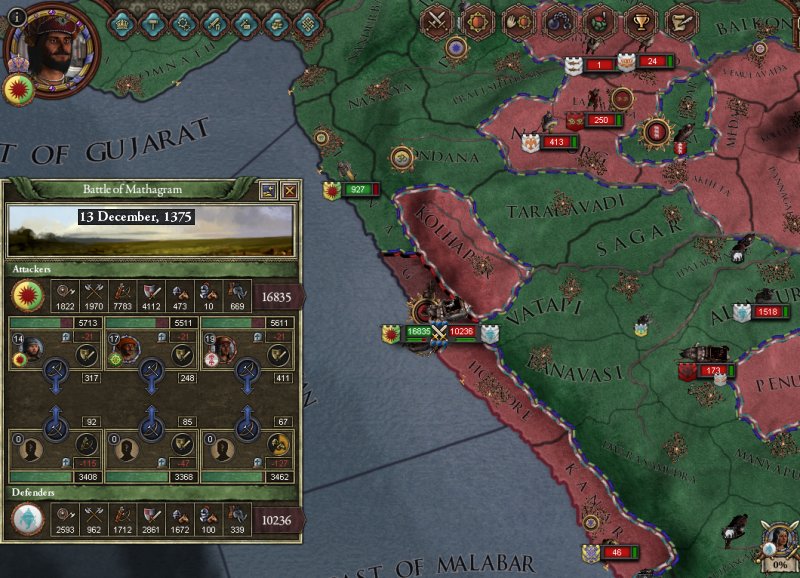
His armies victorious, Haridevnarayan felt a surge of ambition in his life. Few men could aspire to be emperors, but there was a greater title still that he could pursue; that of Samrat Chakravartin! Who, before him, was so close to unifying the whole of India? Who else could claim to be Emperor of Emperors?
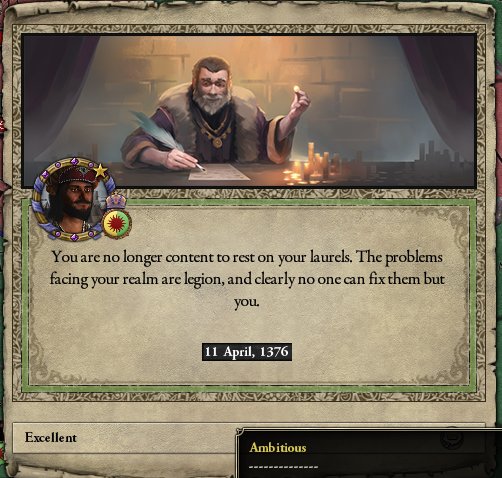
Yet, no sooner had these dreams of grandeur entered the Samrat’s heart than frail reality thwarted them. His claimant kinsman died of ill health, even though he was only 19 years old, and the war ended inconclusively. Deeming that a supernatural sign, Haridevnarayan put a pause to his grand designs, and reflected upon his actions and upon the nature of the empire he was shaping. Truly, such an endeavour could not succeed except through a strong emphasis on justice. For that is the strongest condition that allows men from distant states, with no familial relations, to trust each other in the formation and defence of a large state. Thus he came to the aid of his erstwhile enemy, Gangambika, against the rebels that were tearing apart the Kingdom of Telingana, and upheld the laws with firmness, compassion, and restraint, in all the cases brought before him by his subjects. It wasn’t long until he became known as Haridevnarayan the Just.

It was in 1380 that he gave audience to another of Gangambika’s slighted uncles, who again promised to become Haridevnarayan’s vassal, as long as the Samrat pressed his claim to the throne of Telingana. Haridevnarayan deemed his cause just, and the final war for India began.

The Samrat’s forces were overwhelming, his strategy flawless, and by the end of 1381 Talingana had ceased to be an independent kingdom. India was united.
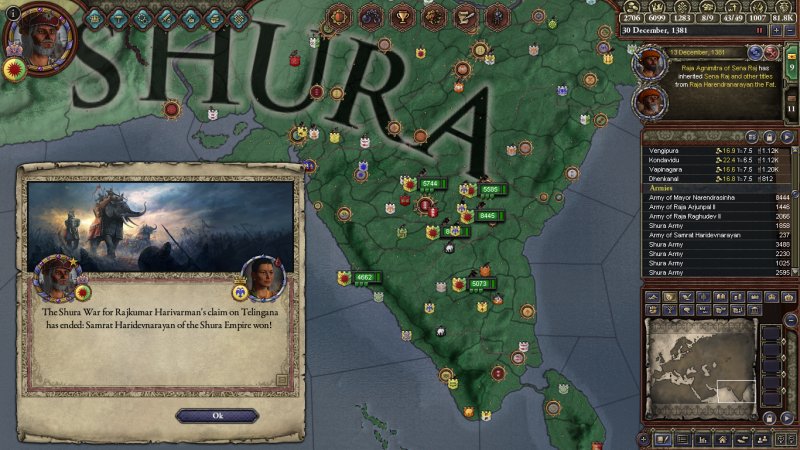
After a month of preparation, Haridevnarayan held a grand ceremony at his capital, where he was proclaimed superior to all who had come before him, save Ashoka. He was the Samrat Chakravartin, and all of India was his to command.

Haridevnarayan was a mature man, in the fifth decade of his life when he became Samrat. He was an excellent diplomat, and had served for many years as his father’s chancellor, but once on the throne he diverted most of his energies into perfecting the art of rulership.

Three years into his reign, he felt comfortable enough to turn his attention to foreign affairs, and in particular to the entreaties of one of his kinsmen, who had a valid claim on the throne of Telingana and pledged to become his vassal if the Samrat were to press it. Haridevnarayan assembled his retinue and enough of his southern levies, and ordered them forward, with great success.

His armies victorious, Haridevnarayan felt a surge of ambition in his life. Few men could aspire to be emperors, but there was a greater title still that he could pursue; that of Samrat Chakravartin! Who, before him, was so close to unifying the whole of India? Who else could claim to be Emperor of Emperors?

Yet, no sooner had these dreams of grandeur entered the Samrat’s heart than frail reality thwarted them. His claimant kinsman died of ill health, even though he was only 19 years old, and the war ended inconclusively. Deeming that a supernatural sign, Haridevnarayan put a pause to his grand designs, and reflected upon his actions and upon the nature of the empire he was shaping. Truly, such an endeavour could not succeed except through a strong emphasis on justice. For that is the strongest condition that allows men from distant states, with no familial relations, to trust each other in the formation and defence of a large state. Thus he came to the aid of his erstwhile enemy, Gangambika, against the rebels that were tearing apart the Kingdom of Telingana, and upheld the laws with firmness, compassion, and restraint, in all the cases brought before him by his subjects. It wasn’t long until he became known as Haridevnarayan the Just.

It was in 1380 that he gave audience to another of Gangambika’s slighted uncles, who again promised to become Haridevnarayan’s vassal, as long as the Samrat pressed his claim to the throne of Telingana. Haridevnarayan deemed his cause just, and the final war for India began.

The Samrat’s forces were overwhelming, his strategy flawless, and by the end of 1381 Talingana had ceased to be an independent kingdom. India was united.

After a month of preparation, Haridevnarayan held a grand ceremony at his capital, where he was proclaimed superior to all who had come before him, save Ashoka. He was the Samrat Chakravartin, and all of India was his to command.

Last edited:
- 2
I realize this episode covered more than 20 years, but even with that long timespan, the collapse of Telingana is stunning. Not surprising, given the disparity in power, but still stunning in its one-sidedness. The final outcome here is not in doubt.
EDIT: That was written after the penultimate update - I somehow missed the big update right beneath it. I'll have to read it and comment on it later, so for now I'll just look silly.
EDIT: That was written after the penultimate update - I somehow missed the big update right beneath it. I'll have to read it and comment on it later, so for now I'll just look silly.
A very well-done AAR. Great to see India finally united! All hail Samrat Haridevnarayan!
Congratulations on forming India! Are you planning on playing out the last ~80 years or will you end it here?
All hail Haridevnarayan, Final Boss of India!
About time, too!
I realize this episode covered more than 20 years, but even with that long timespan, the collapse of Telingana is stunning. Not surprising, given the disparity in power, but still stunning in its one-sidedness. The final outcome here is not in doubt.
EDIT: That was written after the penultimate update - I somehow missed the big update right beneath it. I'll have to read it and comment on it later, so for now I'll just look silly.
That's a common danger in forums, especially when there's a new page between chapters. I'm rather pleased by how Telingana imploded. I wasn't sure what to expect, in terms of how long it would have taken me to conquer it, but this turned out very well.
A very well-done AAR. Great to see India finally united! All hail Samrat Haridevnarayan!
Hail the Samrat Chakravartin, Ruler of Earth! And thank you!
Congratulations on forming India! Are you planning on playing out the last ~80 years or will you end it here?
I toyed with the idea of converting to Hinduism and launching holy wars on everyone around me, but I think I've gotten all the proper fun and accomplishments I could out of this game, so I'll only play up to the year 1400, to finish it on a round date. And since I've played until then tonight, I'll be able to conclude this within 2015.
Last edited:
Conclusion: Samrats Chakravartin
~ XXVI ~ 1382 – 1400
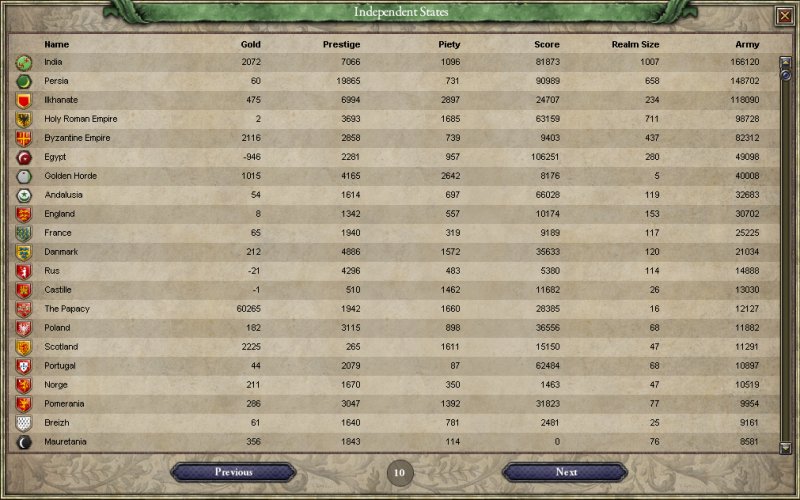
http://www.servimg.com/view/12000377/2683
The Empire of India was, from the start, unequalled in size and power. The two next most powerful states were also its only neighbours, the Seljuk Empire and the Ilkhanate.
http://www.servimg.com/view/12000377/2683
Haridevnarayan took advantage of his inimitable glory to enact new laws on his empire. Feudal lords, for the first time in his dynasty’s history, would be required to pay taxes. This was accepted promptly. Such was the command he respected, and his imperial income swelled as a result.
http://www.servimg.com/view/12000377/2683
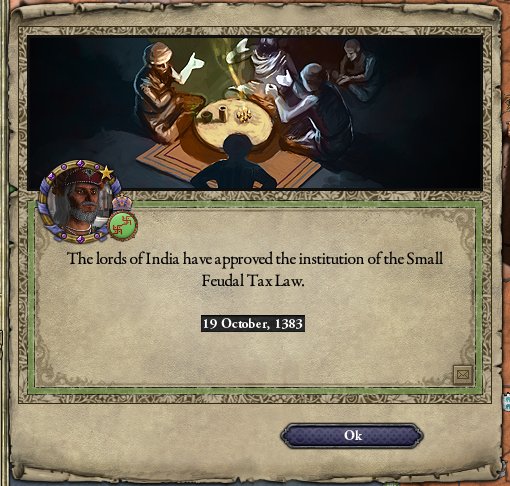
Next came a strengthening of crown authority. This was a more difficult proposition, for it would mean that no lord in India could wage war without the Samrat Chakravartin’s permission. And indeed it was many months (and some say many gifts, official and otherwise) before enough of Haridevnarayan’s vassals voted in its favour.
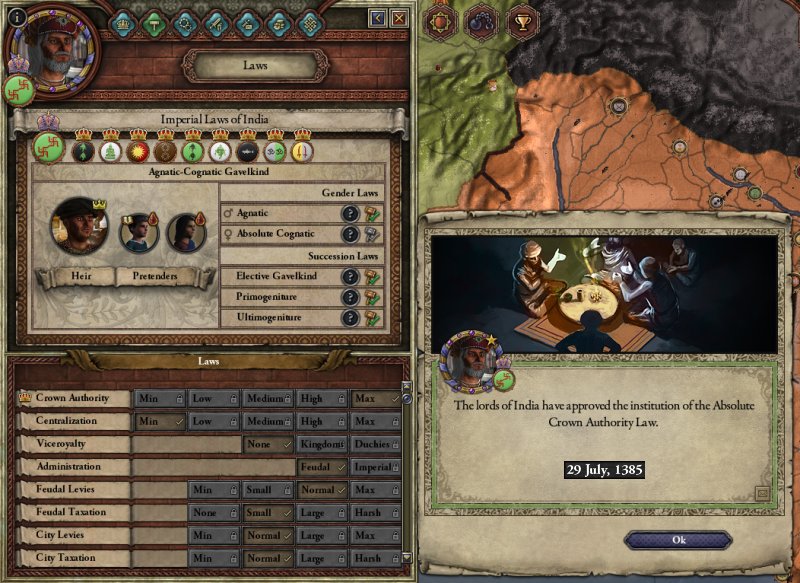
The following years passed with nothing but the minor quibbles of noble life, until in 1393 two adventurers from the lands of the Ilkhanate launched simultaneous invasions into the Indian Empire. Haridevnarayan assembled his forces, and those of his border vassals, to repel them, and planned his strategy to perfection. However, he did not live to see it to fruition. He died a natural death while on that campaign, and passed the world’s greatest empire to his son, Padma Singh.
http://www.servimg.com/view/12000377/2685
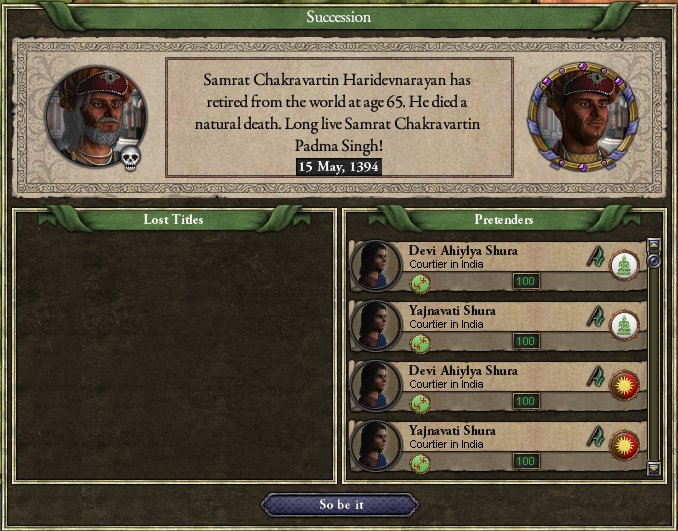
http://www.servimg.com/view/12000377/2686
The new Samrat Chakravartin was not much different from his father, when he had ascended on the throne. He was mature and eminently skilled in diplomacy, governance, and theology, and in addition ambitious and with a strong sense of justice. The empire was in safe hands.
http://www.servimg.com/view/12000377/2686
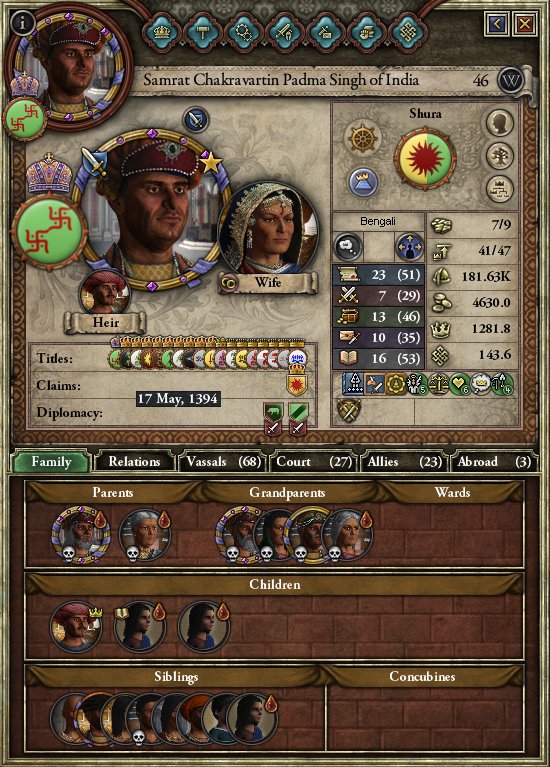
http://www.servimg.com/view/12000377/2687
Under his command, both incursions were dealt with simultaneously, and no one dared to bring war to India again, for the rest of the century.

http://www.servimg.com/view/12000377/2688
In the year 1400 Padma Singh, following the tradition of his ancestors, commissioned maps of the known world.
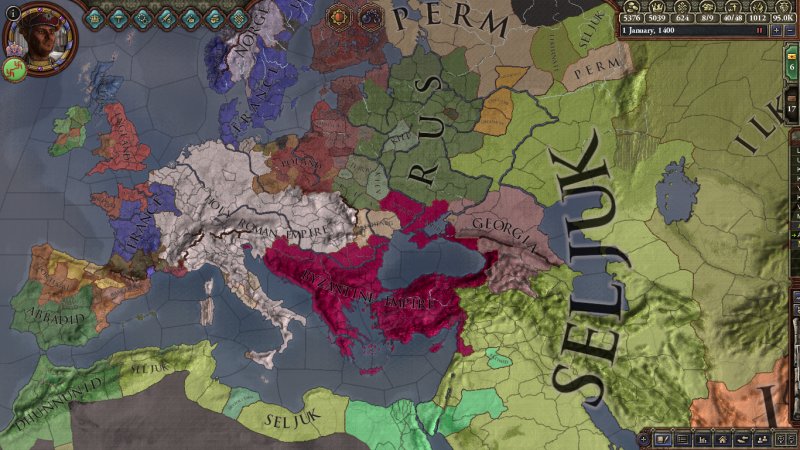
In the west little of any significance had changed, save perhaps for an expansion of Portugal in many directions. The Byzantine Empire was defending against a jihad for Anatolia, and was not very likely to come out victorious. The Kingdom of Jerusalem, the last remnant of Catholic Europe’s old adventures in the Middle East, lives on in the islands on the west coast of Scotland.
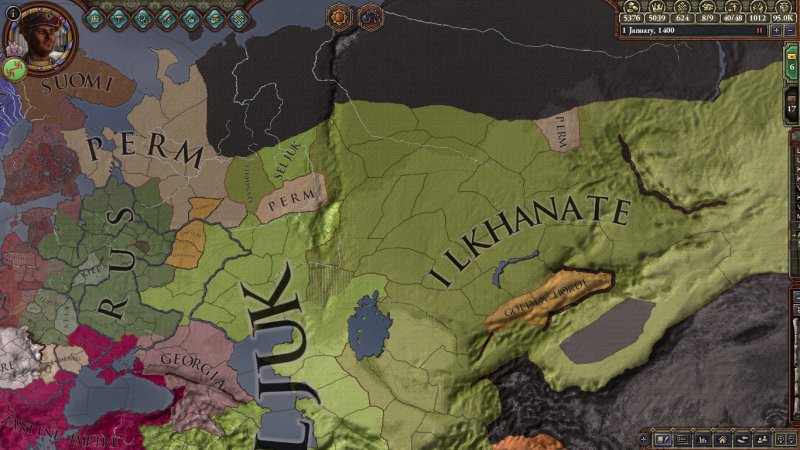
In the north, the Ilkhanate reigns supreme, having easily fought off an attack by the much weakened Golden Horde. It has not, however, sought revenge on the Seljuk Empire for the loss of eastern Persia.
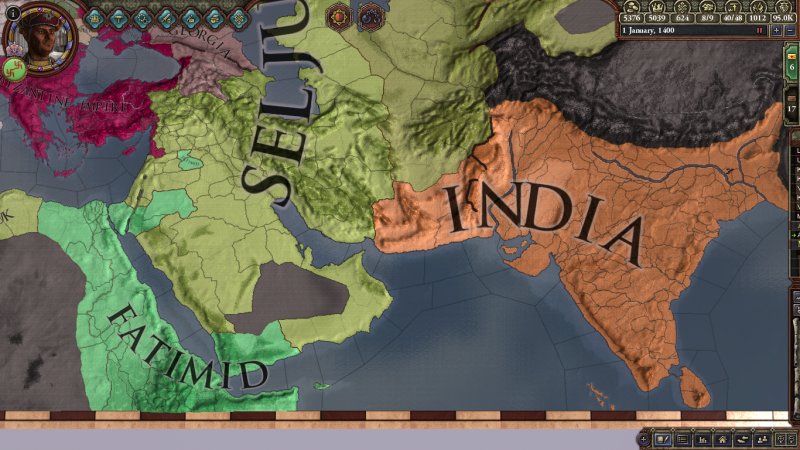
And on the Indian Ocean, three empires vie for supremacy, although India would not deign acknowledge the other two as anything more than kingdoms.
http://www.servimg.com/view/12000377/2691
Perhaps the 15th century would see India assert its hegemony in grand military campaigns. Perhaps it would do so with merchant monopolies. Perhaps it would enrich itself in splendid isolation. But all would be footnotes on the glorious saga of the rise of the imperial House Shura, its chronicle thus here concluded.
THE END
House Shura:
http://www.servimg.com/view/12000377/2691

~ XXVI ~ 1382 – 1400

http://www.servimg.com/view/12000377/2683
The Empire of India was, from the start, unequalled in size and power. The two next most powerful states were also its only neighbours, the Seljuk Empire and the Ilkhanate.
http://www.servimg.com/view/12000377/2683
Haridevnarayan took advantage of his inimitable glory to enact new laws on his empire. Feudal lords, for the first time in his dynasty’s history, would be required to pay taxes. This was accepted promptly. Such was the command he respected, and his imperial income swelled as a result.
http://www.servimg.com/view/12000377/2683

Next came a strengthening of crown authority. This was a more difficult proposition, for it would mean that no lord in India could wage war without the Samrat Chakravartin’s permission. And indeed it was many months (and some say many gifts, official and otherwise) before enough of Haridevnarayan’s vassals voted in its favour.

The following years passed with nothing but the minor quibbles of noble life, until in 1393 two adventurers from the lands of the Ilkhanate launched simultaneous invasions into the Indian Empire. Haridevnarayan assembled his forces, and those of his border vassals, to repel them, and planned his strategy to perfection. However, he did not live to see it to fruition. He died a natural death while on that campaign, and passed the world’s greatest empire to his son, Padma Singh.
http://www.servimg.com/view/12000377/2685

http://www.servimg.com/view/12000377/2686
The new Samrat Chakravartin was not much different from his father, when he had ascended on the throne. He was mature and eminently skilled in diplomacy, governance, and theology, and in addition ambitious and with a strong sense of justice. The empire was in safe hands.
http://www.servimg.com/view/12000377/2686

http://www.servimg.com/view/12000377/2687
Under his command, both incursions were dealt with simultaneously, and no one dared to bring war to India again, for the rest of the century.

http://www.servimg.com/view/12000377/2688
In the year 1400 Padma Singh, following the tradition of his ancestors, commissioned maps of the known world.

In the west little of any significance had changed, save perhaps for an expansion of Portugal in many directions. The Byzantine Empire was defending against a jihad for Anatolia, and was not very likely to come out victorious. The Kingdom of Jerusalem, the last remnant of Catholic Europe’s old adventures in the Middle East, lives on in the islands on the west coast of Scotland.

In the north, the Ilkhanate reigns supreme, having easily fought off an attack by the much weakened Golden Horde. It has not, however, sought revenge on the Seljuk Empire for the loss of eastern Persia.

And on the Indian Ocean, three empires vie for supremacy, although India would not deign acknowledge the other two as anything more than kingdoms.
http://www.servimg.com/view/12000377/2691
Perhaps the 15th century would see India assert its hegemony in grand military campaigns. Perhaps it would do so with merchant monopolies. Perhaps it would enrich itself in splendid isolation. But all would be footnotes on the glorious saga of the rise of the imperial House Shura, its chronicle thus here concluded.
THE END
House Shura:
http://www.servimg.com/view/12000377/2691

- 1
An excellent AAR through and through. I'm guessing you're not going to convert to EU IV. Still, it'd be interesting to see how western colonizers faired attempting incursions into a unified and powerful Indian Empire.
Yeah, I don't think I'll be converting it. I'll hang on the the save, though, in case I ever change my mind. Such a powerful India would no doubt seek to establish colonies of its own in Indonesia and Africa. Keeping up with the Europeans technologically might become a challenge after a while, but contact with them would also make it easier to eventually westernize.
Depending on your technology level, you might start out already western tech. Very nice! A well-written chronicle of greatness. I'm inspired to try something similar for my next game of CK II.
And now I've finally read the last two updates. Well done, it's been quite the adventure. I understand your decision to stop the game now that you've met all your goals, but I'm glad to see you tidied up your house (with the implementation of feudal taxes and crown authority). It creates a nice end point.
Thanks, Philadelphus and Stuyvesant. I was hoping for Timur the Lame to shake things up in the region, and give me a reason to become interested in the west, but he most likely died before embarking on any adventures. So the AAR ends in stability, peace, and centralization of royal power.
Excellent AAR as usual Selzro. I can't remember, is Shura a vanilla dynasty or custom? Also, do you any other AAR plans?
It's a vanilla dynasty. I wanted to start as a small duke-level Buddhist in 1066, and Shura seemed like an interesting one, being on the border of the Raj of Benghal.
I think I'm gonna take a break from AARs for a while. Besides, I'm mostly playing Ultimate General: Gettysburg and DEFCON these days. But I do have a crazy idea for something to try in EU: Rome, so if I pull it off there might be an AAR in it, eventually. I've also been meaning to try forming a merchant republic in Athens, in CK2, in 1204, but I'm not going to try that anytime soon.
I think I'm gonna take a break from AARs for a while. Besides, I'm mostly playing Ultimate General: Gettysburg and DEFCON these days. But I do have a crazy idea for something to try in EU: Rome, so if I pull it off there might be an AAR in it, eventually. I've also been meaning to try forming a merchant republic in Athens, in CK2, in 1204, but I'm not going to try that anytime soon.
I actually forgot I was following this! :O
Glad to see the Shuras have finally achieved their dream of uniting India under a single flag. Their story may be over for now, but hopefully their legacy shall endure for centuries to come.
Glad to see the Shuras have finally achieved their dream of uniting India under a single flag. Their story may be over for now, but hopefully their legacy shall endure for centuries to come.

